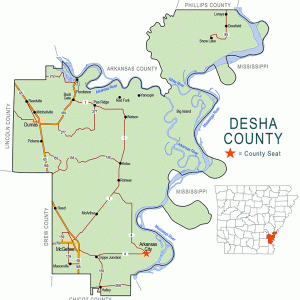calsfoundation@cals.org
Mitchellville (Desha County)
| Latitude and Longitude: | 33º54’20″N 091º29’56″W |
| Elevation: | 164 feet |
| Area: | 0.12 square miles (2020 Census) |
| Population: | 293 (2020 Census) |
| Incorporation Date: | May 21, 1963 |
Historical Population as per the U.S. Census:
|
1810 |
1820 |
1830 |
1840 |
1850 |
1860 |
1870 |
1880 |
1890 |
1900 |
|
– |
– |
– |
– |
– |
– |
– |
– |
– |
– |
|
1910 |
1920 |
1930 |
1940 |
1950 |
1960 |
1970 |
1980 |
1990 |
2000 |
|
– |
– |
– |
– |
– |
– |
494 |
618 |
513 |
497 |
|
2010 |
2020 |
|
|
|
|
|
|
|
|
|
360 |
293 |
|
|
|
|
|
|
|
|
Mitchellville, a city in the Arkansas Delta that borders Dumas (Desha County), is the result of experiments in city planning. A church association acquired the land in the 1940s, divided it into lots, and sold the lots to a specific group of buyers, while also planning the placement of roads and electric service. With the highest percentage of African-American citizens of any city in Arkansas, Mitchellville is also one of the poorest cities in the state.
The rich soil of the Arkansas Delta drew investors who created plantations and grew cotton. Until the Civil War, work on the plantations was performed almost entirely by slaves. The Thirteenth Amendment to the U.S. Constitution abolished slavery, but many of the former slaves and their descendants remained on the land, working as sharecroppers for the same landowners. A boom in cotton prices during World War I ended with the war, and the reduced prices for cotton in the 1920s, along with disastrous weather and continued unsettled racial relations, prompted some landowners to sell or abandon their property. Much of the land ended up in the hands of the federal government, which tried in various ways to care for Americans and to end the Depression of the 1930s.
One New Deal program, the National Youth Administration (NYA), acquired thirty-seven acres of land north of Dumas, where it established a camp for young unemployed workers. Unemployment became a smaller problem for the United States when the country entered World War II, and the NYA closed the camp in 1944. The land was purchased from the NYA by the Watson District Association, a group of twenty-nine black congregations in Desha and Lincoln counties. The association divided the land into lots, which they sold to black families, sometimes for as little as fifty dollars. Electricity was available to the new homeowners, but water, sewage systems, and paved roads were not provided. The community was named Mitchellville to honor John Mitchell, the leader of the association. The emergence of Mitchellville later inspired the creation of the community of Reed (Desha County).
Some jobs were provided in Mitchellville by the Grain Dryer Cooperative and by the Purveyor Wood Products Company, which built a mill in Mitchellville in 1957. The community incorporated as a second-class city on May 21, 1963, hoping to increase city services to its citizens. However, an effort to obtain a loan and grant from the federal government to install a water line in the city instead caused the city to fall into bankruptcy.
Civil rights leader Daisy Bates learned of the plight of Mitchellville and began working to improve the city’s situation. She was helped by Bob Riley, then a professor at Ouachita Baptist University. Students under the direction of Bates and Riley conducted surveys of the city and its houses and began educating the citizens about government to helping them see what was possible for the city. A water and sewer system was established by 1970, funded by a federal grant of $46,000 and a $66,000 federal loan. Citizens applied for homeowner loans through the federal Farm Home Administration, and a federal credit union was established in Mitchellville. Bates purchased, for one dollar, a fire truck from the New York City Fire Department and then exchanged the truck with the Little Rock Fire Department to provide Mitchellville with a smaller truck, fully equipped and stocked with clothing and helmets for volunteer firefighters. A Headstart program was established in 1973, aiming to reduce illiteracy in Mitchellville, which had been measured in the 1960s at seventy-five percent.
The population of Mitchellville declined from 497 to 360 between 2000 and 2010. Some city services were discontinued, although a new city hall and some apartment buildings were constructed. One convenience store is located on Highway 65 in Mitchellville (although the business uses a Dumas address). Mitchellville is part of Dumas’s school system.
For additional information:
Barker, Geoff. “Daisy Bates and Mitchellville: A Forgotten Part of the Legacy.” Pulaski County Historical Review 59 (Winter 2011): 112–121.
“Daisy Bates in Mitchellville—Mitchellville, Arkansas: Part Two.” Points South, an Oxford American Podcast, February 15, 2024. https://oxfordamerican.org/pointssouth/episodes/daisy-bates-in-mitchellville (accessed March 19, 2024).
“Foundations of a Black Town—Mitchellville, Arkansas: Part One.” Points South, an Oxford American Podcast, February 8, 2024. https://oxfordamerican.org/pointssouth/episodes/foundations-of-a-black-town (accessed March 19, 2024).
“Mitchellville Sees Inevitable—It’ll Let Whites Move In.” Arkansas Gazette, January 2, 1967, p. 12A.
Stover, Bobby, and Lamar James. “Ouachita Students Will Aid Mitchellville.” Arkansas Gazette, January 7, 1968, p. 5E.
Steven Teske
Butler Center for Arkansas Studies
 Desha County Map
Desha County Map 




Comments
No comments on this entry yet.